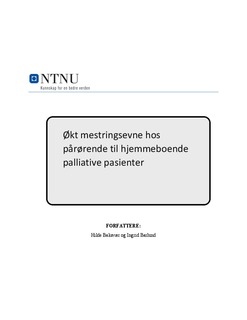| dc.contributor.advisor | Nordgren, Kirsten | |
| dc.contributor.author | Baksvær, Hilde | |
| dc.contributor.author | Barlund, Ingrid | |
| dc.date.accessioned | 2016-09-08T12:54:45Z | |
| dc.date.available | 2016-09-08T12:54:45Z | |
| dc.date.issued | 2016-09-08 | |
| dc.identifier.uri | http://hdl.handle.net/11250/2405502 | |
| dc.description.abstract | Innledning: Mange pasienter ønsker å være hjemme i den palliative fasen. Det å være hjemme i denne fasen rammer ikke bare det fysiske, men også det psykiske, sosiale og eksistensielle hos pårørende. Det er opp til pårørende og hjemmesykepleien å ta seg av pasienten. Om dette er mulig avhenger av hvordan pårørende mestrer omsorgsrollen. Hensikt: Hensikten med denne studien var å undersøke hvordan sykepleier kunne hjelpe pårørende til å mestre omsorgsrollen bedre. Metode: Dette er en litteraturstudie som er basert på 5 kvalitative studier, 1 kvantitativ studie og annen relevant faglitteratur. Resultat: For å mestre omsorgsrollen trenger pårørende informasjon, mental og emosjonell støtte, veiledning samt avlastning. Dersom pårørende får dette, kan sykepleieren hjelpe dem både med egen helse, samt forebygge depresjon. Konklusjon: Ved å gi informasjon, støtte, veiledning, undervisning, forhindre sosial isolasjon og inkludere pårørende i behandlingen kan sykepleieren bidra til at pårørende får økt mestringsevne. | nb_NO |
| dc.description.abstract | Introduction: Many patients want to be at home during the palliative phase. Staying at home during this phase does not only have a physical impact, but also a psychological, social and existential impact on the closest relatives. It is up to the Home Care health professional to take care of the patient, and to what extent this possible depends on how the closest relatives handle their role as caregivers. Purpose: The purpose of the study is to find out how the Home Care health professional can help the closest relatives to improve their performance as caregivers. Method: This is a literature study based on five qualitative studies, one quantitative study and other relevant academic literature. Result: To handle their role as caregivers, the closest relatives need information, mental and emotional support, guidance and assistance to lift the burden they go through. If they get this support, the Home Care health professional can help them with their own health and prevent depression. Conclusion: By giving information, support and guidance, and prevent social isolation, as well as including the closest relatives in the treatment process, the home care health professional can make the closest relatives perform better as caregivers and make them feel useful. | nb_NO |
| dc.language.iso | nob | nb_NO |
| dc.subject | Pårørende | nb_NO |
| dc.subject | Cancer | nb_NO |
| dc.subject | Sykepleie | nb_NO |
| dc.subject | Hjemmesykepleie | nb_NO |
| dc.subject | Mestring | nb_NO |
| dc.subject | Nursing | nb_NO |
| dc.subject | Home | nb_NO |
| dc.subject | Home Health Care | nb_NO |
| dc.subject | Coping | nb_NO |
| dc.title | Økt mestringsevne hos pårørende til hjemmeboende palliative pasienter. | nb_NO |
| dc.title.alternative | Increased coping ability to next of kin at patients in homebased palliative care. | nb_NO |
| dc.type | Bachelor thesis | nb_NO |
| dc.subject.nsi | VDP::Medical disciplines: 700::Health sciences: 800::Nursing science: 808 | nb_NO |
| dc.source.pagenumber | 53 | nb_NO |
